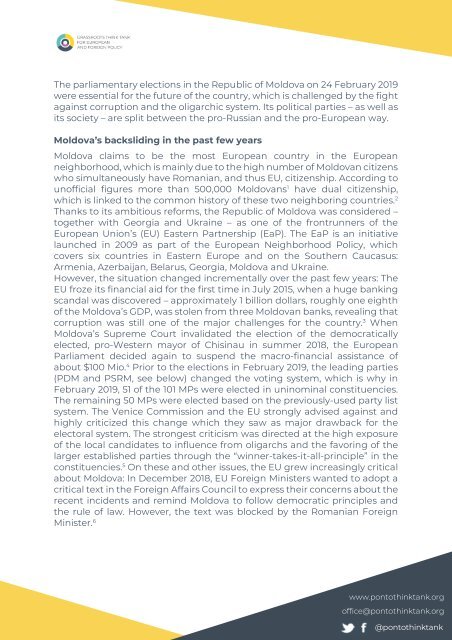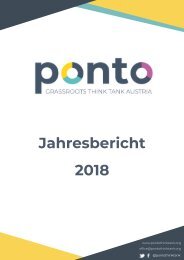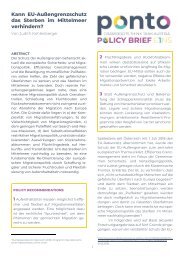Moldova-Blog-Article
- No tags were found...
Create successful ePaper yourself
Turn your PDF publications into a flip-book with our unique Google optimized e-Paper software.
The parliamentary elections in the Republic of <strong>Moldova</strong> on 24 February 2019<br />
were essential for the future of the country, which is challenged by the fight<br />
against corruption and the oligarchic system. Its political parties – as well as<br />
its society – are split between the pro-Russian and the pro-European way.<br />
<strong>Moldova</strong>’s backsliding in the past few years<br />
<strong>Moldova</strong> claims to be the most European country in the European<br />
neighborhood, which is mainly due to the high number of <strong>Moldova</strong>n citizens<br />
who simultaneously have Romanian, and thus EU, citizenship. According to<br />
unofficial figures more than 500,000 <strong>Moldova</strong>ns 1 have dual citizenship,<br />
which is linked to the common history of these two neighboring countries. 2<br />
Thanks to its ambitious reforms, the Republic of <strong>Moldova</strong> was considered –<br />
together with Georgia and Ukraine – as one of the frontrunners of the<br />
European Union’s (EU) Eastern Partnership (EaP). The EaP is an initiative<br />
launched in 2009 as part of the European Neighborhood Policy, which<br />
covers six countries in Eastern Europe and on the Southern Caucasus:<br />
Armenia, Azerbaijan, Belarus, Georgia, <strong>Moldova</strong> and Ukraine.<br />
However, the situation changed incrementally over the past few years: The<br />
EU froze its financial aid for the first time in July 2015, when a huge banking<br />
scandal was discovered – approximately 1 billion dollars, roughly one eighth<br />
of the <strong>Moldova</strong>’s GDP, was stolen from three <strong>Moldova</strong>n banks, revealing that<br />
corruption was still one of the major challenges for the country. 3 When<br />
<strong>Moldova</strong>’s Supreme Court invalidated the election of the democratically<br />
elected, pro-Western mayor of Chisinau in summer 2018, the European<br />
Parliament decided again to suspend the macro-financial assistance of<br />
about $100 Mio. 4 Prior to the elections in February 2019, the leading parties<br />
(PDM and PSRM, see below) changed the voting system, which is why in<br />
February 2019, 51 of the 101 MPs were elected in uninominal constituencies.<br />
The remaining 50 MPs were elected based on the previously-used party list<br />
system. The Venice Commission and the EU strongly advised against and<br />
highly criticized this change which they saw as major drawback for the<br />
electoral system. The strongest criticism was directed at the high exposure<br />
of the local candidates to influence from oligarchs and the favoring of the<br />
larger established parties through the “winner-takes-it-all-principle” in the<br />
constituencies. 5 On these and other issues, the EU grew increasingly critical<br />
about <strong>Moldova</strong>: In December 2018, EU Foreign Ministers wanted to adopt a<br />
critical text in the Foreign Affairs Council to express their concerns about the<br />
recent incidents and remind <strong>Moldova</strong> to follow democratic principles and<br />
the rule of law. However, the text was blocked by the Romanian Foreign<br />
Minister. 6<br />
www.pontothinktank.org<br />
office@pontothinktank.org<br />
@pontothinktank




